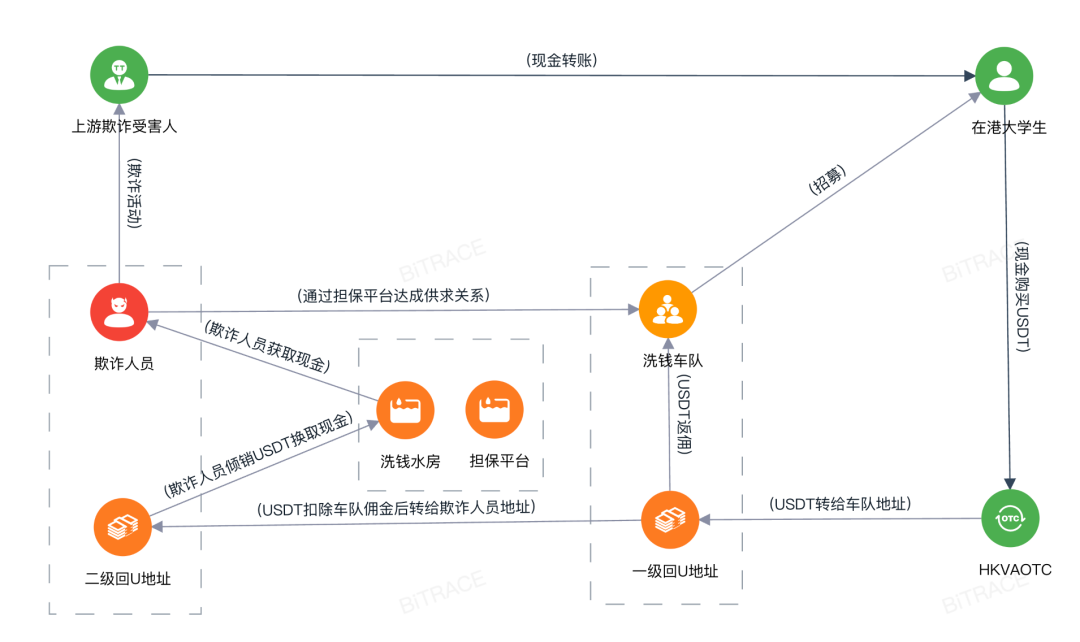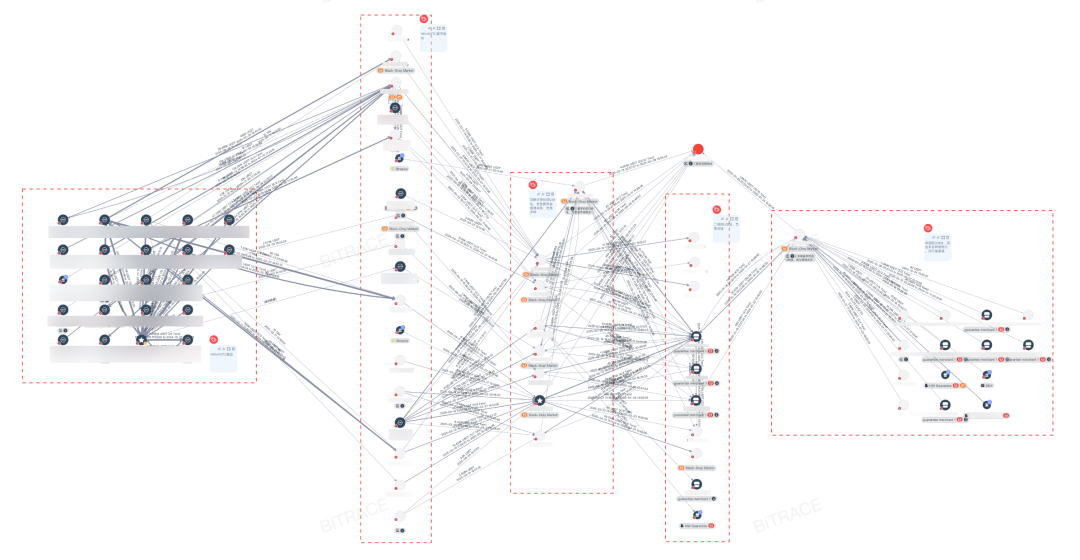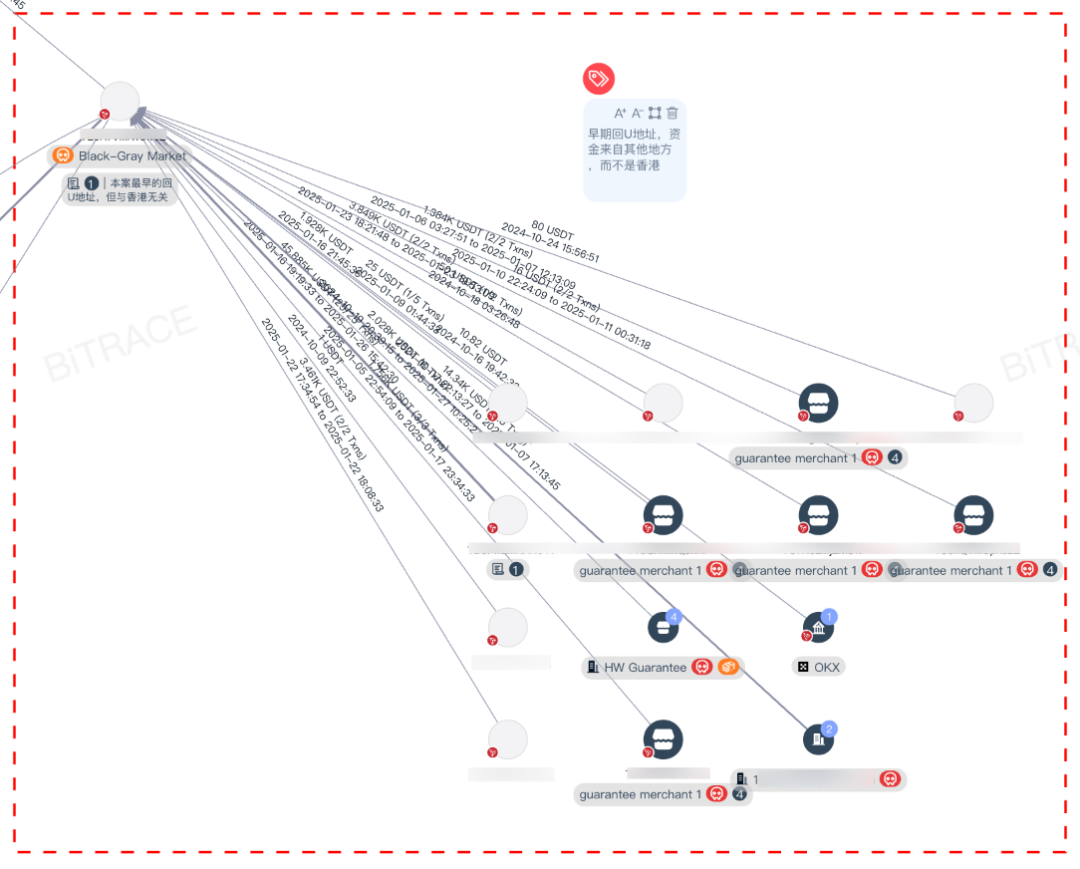As a world-renowned free port and international financial center, Hong Kong has already seen the emergence of a prosperous crypto-economic ecosystem several years before the official preferential policies were introduced. Among them, virtual asset over-the-counter trading service providers (VAOTC) that conduct business in the form of offline stores and online groups are particularly distinctive. Together with local native and overseas virtual asset trading service providers (VATP), they provide token exchange and deposit and withdrawal services for Hong Kong virtual asset investors.
However, due to the high anonymity and borderless nature of virtual assets based on blockchain technology, various cryptocurrencies related to criminal activities, especially stablecoins, can flow into the Hong Kong crypto ecosystem without obstacles, causing financial pollution to the business addresses of local operators and ordinary investors, and bringing legal and compliance risks.
This article aims to use the recent money laundering incident involving mainland college students in Hong Kong as a starting point for analysis, explore how the Southeast Asian fraud industry has harmed Hong Kong's crypto economy in this incident, and disclose relevant data.
Event Description
On March 26, 2025, a mainland college student received a part-time job on a second-hand goods trading platform and was asked to go to Hong Kong to purchase a certain amount of Tether (USDT) through a local money exchange and transfer it to a designated blockchain address. The errand process is to use a personal bank card to collect RMB, and after exchanging it for Hong Kong dollar cash at a local fiat currency exchange shop, go to a designated cryptocurrency exchange shop to buy USDT and have the store transfer it directly to a designated wallet.

After the student purchased USDT worth tens of thousands of yuan in this way, his bank card and WeChat payment were frozen by mainland law enforcement agencies, and he was told that the funds he received were transferred by victims in an upstream fraud incident.
After investigation by Bitrace and Mankiw Law Firm, it was found that this was a typical "card-to-U" money laundering method, which was closely related to the organized crime network in Southeast Asia.
On-chain analysis
A fund analysis of the designated receiving address TTb8Fk revealed that the student purchased 2,396 USDT from a designated money changer, which then flowed into the guarantee platform merchant address TKN5Vg, which has long had business ties with HuioneGuarantee and NewcoinGuarantee in Southeast Asia.

These two guarantee platforms have long provided services to the organized crime industry in Southeast Asia, including illegal online gambling, black and gray industries, money laundering, fraud, etc. In this incident, they played the role of helping to deal with upstream fraud funds.
This shows that this was a vicious incident in which a Southeast Asian fraud group used Hong Kong's cryptocurrency money changers to launder funds.

The model is the common "Crypto-based money laundering" method, which means that after the money launderers receive the stolen money in fiat currency from the victims of fraud, they quickly go to the over-the-counter market to exchange it for USDT, and then transfer it back to the blockchain address of the fraudsters, and get commissions from it. Since the purchase of USDT requires a large number of bank cards and real-name information, money launderers will recruit a large number of part-time workers in advance to form a "Crypto Laundering Syndicate", and these part-time workers are called "cannons" or "drivers".
In this incident, the mainland students became money launderers without knowing it, and together with Hong Kong VAOTC, they helped the money launderers complete the conversion of funds. The USDT obtained first entered the team address, and after deducting the commission (the calculated rebate ratio was 33%), the team transferred the funds to the guarantor merchant, and finally settled the funds through the guarantee platform.
Industrialization of crime
Bitrace further expanded the rebate address TGeZzC of the money laundering team and found that this money laundering incident was not an isolated case, but the tip of the iceberg of a highly industrialized large-scale money laundering gang.

Tracing the source of funds of the rebate address, we can find 7 other first-level rebate U addresses (third from left). These addresses are at the same level as TTb8Fk. They all received varying amounts of USDT from Hong Kong money changers (first from left, second from left, HKVAOTC), of which 33% was transferred to the rebate address (marked in red) and 67% was transferred to the second-level rebate U address (second from right). They were then dumped through the guarantee platform. The whole process has a very clear division of labor.

Analysis shows that this batch of addresses has been active since 2024. The initial source of funds has nothing to do with Hong Kong, but a large number of Southeast Asian black and gray risk addresses. This further indicates that behind this case is a gang closely related to the Southeast Asian organized crime network.
In less than three months, this money laundering team alone has illegally laundered more than 310,000 US dollars in Hong Kong using the same method. Considering that there are still other addresses that have not been expanded or other gang addresses that have not been detected in this case, the actual scale of this type of illegal industrial money laundering activity using HKVAOTC may be even larger.
Hong Kong VAOTC Industry on the Eve of Dawn
Shao Shiwei, a lawyer at Shanghai Mankiw Law Firm, said that from a global perspective, the regulatory framework for OTC traders in various countries and regions has not yet reached a completely unified level. However, major OTC operating locations such as Hong Kong, the European Union, and the United States have begun to formulate relevant laws and license management regulations.
Taking Hong Kong as an example, the Financial Services and Treasury Bureau (FSTB) issued a legislative consultation document on virtual asset over-the-counter (OTC) services in February 2024. An important suggestion was made in the document, namely, to introduce a licensing system for OTC traders with the help of the Anti-Money Laundering and Terrorist Financing Ordinance (AMLO). According to this proposal, Hong Kong plans to establish a licensing management system for OTC traders through the Anti-Money Laundering and Terrorist Financing Ordinance (AMLO), the core purpose of which is to ensure that these companies can meet compliance requirements such as anti-money laundering (AML) and customer identity verification (KYC).
This means that all companies that provide virtual asset OTC trading services, including OTC dealers, must apply for the corresponding license from the Hong Kong Customs and Excise Department (CCE) and strictly abide by relevant legal provisions. However, as of now, the legislation is still in the consultation stage, and the specific implementation details and effective time are still to be officially announced by the government.
Industry operators need to actively respond to supervision
At present, VAOTC has become an indispensable part of the cryptocurrency market, playing an extremely critical role in market stability and industry development. With the upcoming introduction of OTC compliance policies in Hong Kong, operators in the industry must take a more proactive attitude to meet regulatory requirements.
Operators in the industry not only need to strictly abide by the licensing system that is about to be implemented, but also need to establish and improve internal compliance systems to ensure that all trading activities meet anti-money laundering (AML) and customer identity verification (KYC) compliance requirements.
At the same time, operators should further strengthen communication and exchanges with regulatory agencies, proactively learn about the latest policy developments, and actively participate in industry self-regulatory organizations to contribute their own efforts to promote the standardized development of the entire industry.
In this process, industry operators need to pay special attention to refusing to be associated with any crypto funds involved in illegal activities. By implementing strict customer due diligence and transaction monitoring measures, they can identify and resist suspicious fund flows and avoid providing any convenience for illegal activities.
This not only helps maintain the company's own good reputation, but is also an important manifestation of the company's fulfillment of its social responsibility.
In general, the upcoming OTC compliance policy in Hong Kong is an important opportunity for the virtual asset OTC industry to achieve standardized development. Operators in the industry should firmly grasp this opportunity, actively adapt to changes in the regulatory environment, and continuously improve their compliance level to enhance their competitiveness. Only in this way can they be invincible in Hong Kong, a market with a prosperous crypto economy, and achieve long-term and stable development.







